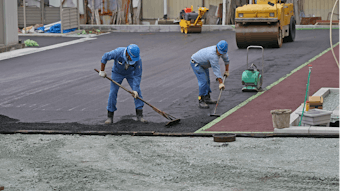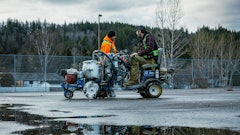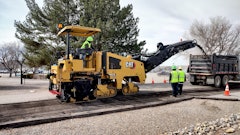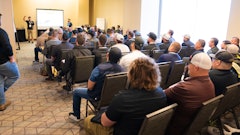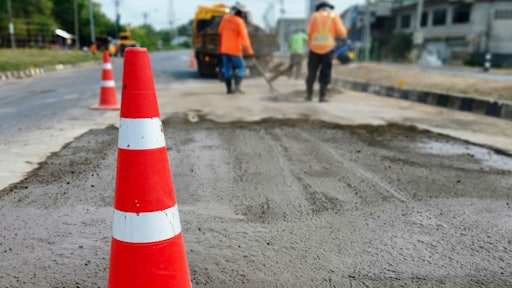
The one truly consistent thing you can say about the work of asphalt, is that every day, something will probably go wrong. From breakdowns to bad weather, you can never predict what's going to happen. Curious about what are the most frequent and frustrating "headaches" contractors face on a daily basis, we did a deep dive on the Asphalt Life community (which has over 110,000 members) and sourced answers from the men and women who are out there paving, on what pain-points and problems they most frequently run into when on the job. Here's what they had to say:
9. Bad Preparation / Bad Base
 AdobeStock_371751914
AdobeStock_371751914
Getting to a jobsite as a paving crew, only to discover that the client's base is unsatisfactory is not what you want to happen. Especially, if it wasn't factored into the quote and job costing figures. Many experienced workers can tell if there are problems with the base before old surfaces are milled up, just based on the deformations and cracks in the asphalt. However, that isn't always the case, and sometimes the contractor who does the site prep isn't the same as the paving contractor.
Mike Donati, formerly an employee of Planet Asphalt said, "When rock work is [messed] up and the rock contractor tell you every lie in the book that it's all good. So, you cover it up and the problem becomes yours."
Proper base prep is always a critical part of ensuring a pavement surface is long-lasting and resilient through weather, erosion, and the wear-and-tear of traffic volume. If it's not right, nothing else will really be right. Mike Adams agreed with Donati, and said it's a pain, "Going to a pave job and having to [re]do prep because the prep crew was[n't up to par]."
8. Weather
 AdobeStock_404554033
AdobeStock_404554033
This one seems obvious, and worst of all, it's completely outside of anyone's control. Bad weather can take a potentially great day of pavement work, and flush it down the drain. It's not just heavy rain storms either. More and more extreme heat waves made pavement work a fairly hazardous business. During the mid-summer of 2023 part of the southwestern United States saw weeks of sustained one hundred degree days. Particularly, in Arizona, there were reportedly multiple instances of people being burned when coming into contact with blacktop surfaces.
According to contractors, this was the eighth biggest headache, and likely was down on the list because it's not anyone's fault when it ruins your day. What some contractors did say was that it's good to pay attention to the weather forecasts, and make plans for employees to do alternative tasks when possible. Maintenance, cleaning, and other shop-related tasks can be addressed when the asphalt can't go down.
7. Frequent Change Orders
Every job you go onto will face unexpected alterations or changes from the original plan, on some scale. Sometimes those change orders can mean added scope, and other times it might mean added days on the job, depending on the size of the order. They can be both necessary changes or just the result of a client wanting something else done, "while you're at it."
As a member of the crew, it seems like the biggest reason this "headache" made the list was due to the fact that it interrupts the flow of work. Most of the time, the process of doing a job has a consistent and predictable repetition to it. Walking onto the jobsite only to discover a few change order can pretty quickly put a monkey-wrench in how you expected the day to go. The negative impact of change orders can be reduced by improving communication between your sales and office staff, and your on-site teams or project managers.
6. Overly Demanding or High Maintenance Clients
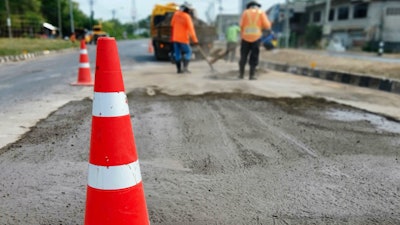 AdobeStock_336004603
AdobeStock_336004603
Every single contractor has a handful of stories about high-maintenance clients, and if you don't, you probably just haven't been in the business long enough yet. It comes with the territory. Asphalt and pavement work is an expensive investment on both the commercial and residential sides of the industry. It isn't a big mystery why a customer would care, but, even still, some can go above and beyond that.
Scott Curtis (MAC Surfacing Limited) said, "Paving is a pleasure, always has been, always will be. It's the clients that can be the headache." and another crew worker, Jordan Levea (Tom Greenauer Development Inc.) seemed to agree with that sentiment. Levea said, "The customer watching us and questioning our every move," that definitely appears to be a major sticking point for people on the job.
5. Job Layouts
 AdobeStock_373342136
AdobeStock_373342136
It's a true rarity for a commercial parking lot to just be a plain rectangle of asphalt. More often than not, you're having to navigate your pavers, milling machines, and rollers around a whole host of obstacles. Concrete islands where grass, trees, and shrubs are planted certainly make a property more visually appealing, but they are also a headache when there are a dozen of them dotted across the mat. Tamran Steen called them, "Pac-man islands."
Nick Koski (Sheppard Contracting, Inc.) said, "From an operators perspective, paving city streets [is a headache]. Power/cable lines at every house. I have to put my truck up and down every 50 feet! Makes it very slow going." and then there was a reply to this answer as a comment, which offered a potential solution. Another contractor suggested using a skid steer to feed the hopper for these stretches.
4. Drivers and Pedestrians Entering Work Zones
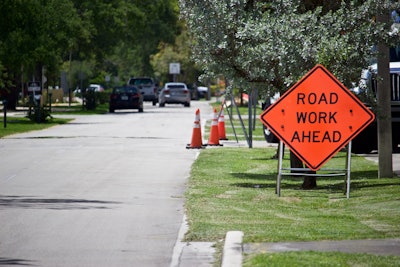 AdobeStock_262751841
AdobeStock_262751841
These last four headaches were all very close, and were MANY contractors and crew's response. This one is especially egregious, as it not only can mess up the work you've done, but it can put people in danger. Perhaps, not as common in large commercial properties like strip malls or office buildings, where phasing is marked and traffic better redirected, but it still happens. You're about to start paving, and you've got people trying to walk or drive through a marked off area. No matter how much outreach or planning you do, there will always be someone who says, "No one told me about this!"
However, it's very common in residential type jobs where you've got residents who are trying to go about their day, and they aren't to enthusiastic about the work you're trying to do. "Everyone wanting to drive into their driveway. And it's always garbage day," said Joshua Stewart (J.F. Kiely Construction Co). Non crew members don't understand that they can't walk on fresh mat asphalt, or even worse, drive their cars on it. I've seen it happen, and one time while visiting a jobsite for a story, I was that guy. I accidentally stepped onto the mat. Thankfully they showed me how to fix it.
3. Asphalt Mix / Segregation
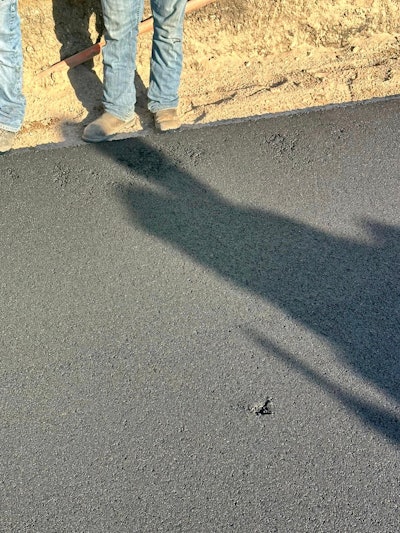 From the Asphalt Life Facebook community group.Jesus Celvera
From the Asphalt Life Facebook community group.Jesus Celvera
A frequent complaint from the asphalt paving crews was concerning the quality of the mix, and how small issues with that can make for larger headaches when they start laying the asphalt down. It wasn't just one thing either, contractors gave multiple examples: segregation, cold chunks in the mix, lack of oil, too much oil, improperly dried material, and voids were the most common mix issues given as answers.
2. Dump Truck Issues
 AdobeStock_306427530
AdobeStock_306427530
By far, this was the second biggest answer. The second most frequent headache that paving crews described had to do with problems they have with trucks and/or their drivers. From waiting on drivers, or truckers not knowing how to properly navigate the jobsite, to bad positioning, and all the way down to dropping loads in front of the paver. That last one is every crews favorite to post pictures of on social media. Did someone say, "GET OUT THE SHOVELS!"
While I won't list the specific, and sometimes intense, scenarios that contracts listed, what seems to be consistent is that a bad truck operator can quickly turn the tide of a day's work. One of the biggest problems seems related to trucker inexperience, and not knowing how to understand the crew's directions or signals. Sometimes it's as simple as just how long it takes waiting on trucks going back and forth to the plant.
1. Labor Ethic
By FAR, the biggest listed headache for paving crews was the work ethic of some of their fellow laborers. Contractors by-and-large were most frustrated by what they interpreted as laziness, goofing around, having to be repeatedly told what to do (what some called "babysitting"), being on cellphones, and other problems like just plain not showing up to work. Some complained that having coworkers that aren't willing to be "team players" and possess a "that's not my job" kind of attitude is the biggest headache period.
Dave Malzone described it like this, "Telling people to do the same things every single day. Then if you don’t tell them what to do they say 'You didn’t tell me.' Grown men shouldn’t have to be babysat." While others described it as simply having a lack of initiative. A lot of asphalt workers seem to be highly attuned and able to detect when a new employee is going to have the goods and be able to make the cut.
On the flip side, a near equal amount of complaints were lodged at management or conflicting leadership. That can't be totally ignored either, because sometimes if you have troubled management, you get troubled workers. Thing flow from the top down.




